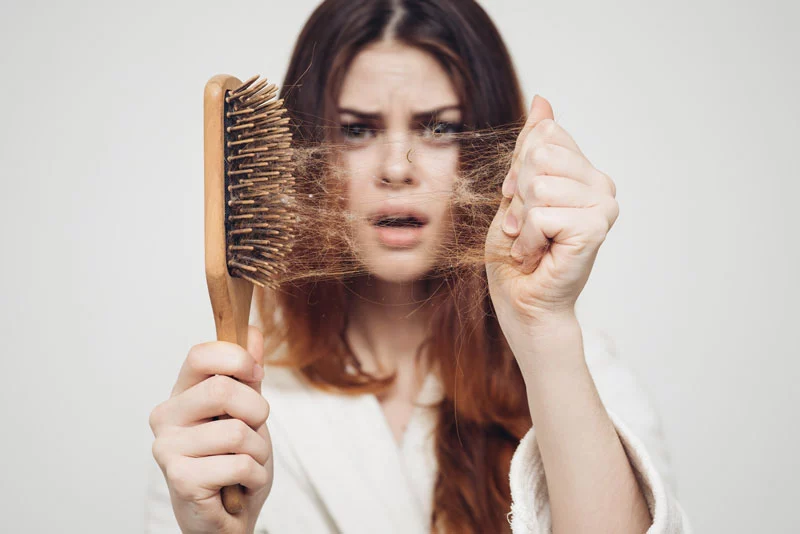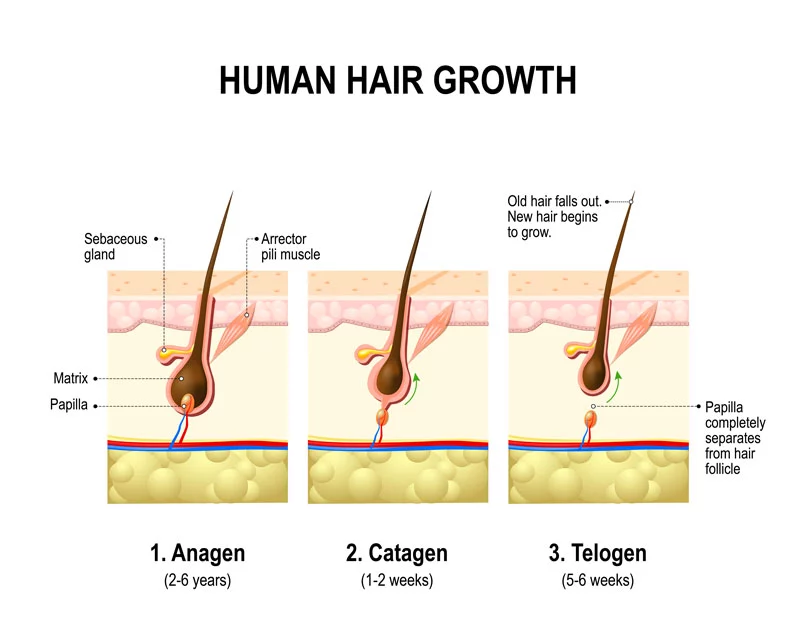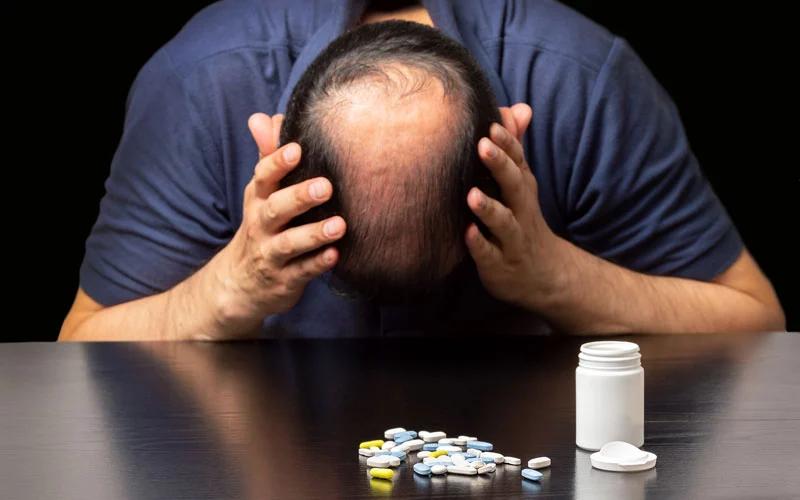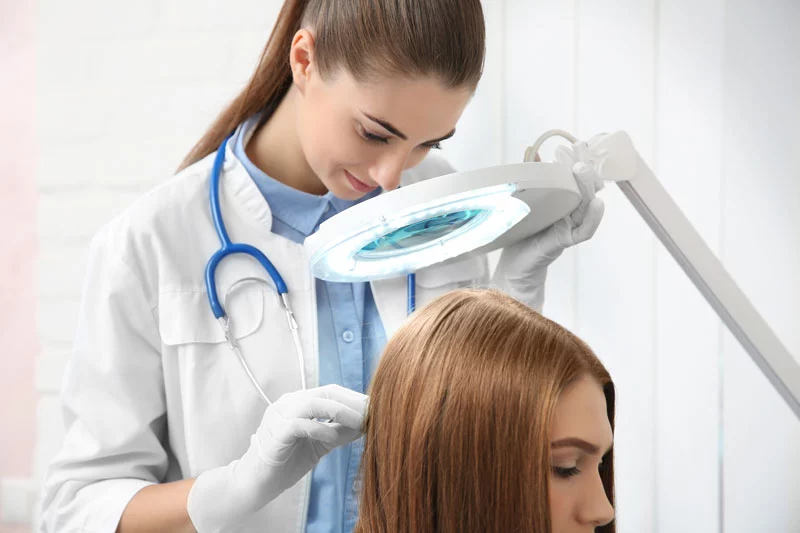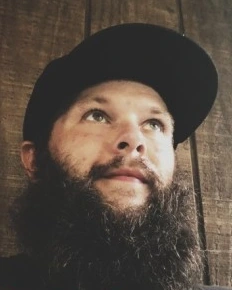What Is Hair Loss?
Table of Contents
- What Is Hair Loss?
- What Causes Hair Loss?
- Links Between Illegal Drug Use and Hair Loss
- How Does Excessive Drug Use Lead to Hair Loss?
- Stages of the Hair Growth Cycle
- Which Illegal Drugs Cause Hair Loss?
- Cocaine and Hair Loss
- Marijuana and Hair Loss
- Meth and Hair Loss
- Adderall and Hair Loss
- Chemical Changes and Hair Loss
- Celebrity Hair Loss Horror Stories
- Paul Sculfur and His Hair Loss Experience
- Tyra Banks and Her Hair Loss Experience
- Jesy Nelson and Her Hair Loss Experience
- Is it Possible to Reverse Hair Loss Caused by Drug Abuse?
- Treating Hair Loss Caused by Illegal Drug Abuse
- Low-Level Laser Therapy
- Lifestyle and Diet Changes
- Stress Reduction and Hair Loss
- Finding the Right Treatment for Hair Loss from Drug Use
- Medically Reviewed By
Hair loss (alopecia) refers to the shedding or thinning of hair from an individual’s body. Anyone can experience hair loss, regardless of sex, age, environment, etc., although it is more common for men. In fact, the average person loses around 50-100 hairs a day; this process usually goes unnoticed, as new hair growth is taking place at the same time. Illegal drugs that cause hair loss can be a significant concern, especially if you’re already losing more than an average amount of hair on daily basis.
Hair loss occurs when an individual is no longer growing new hair to replace what they have lost. Excessive and/or permanent hair loss, in which hair follicles no longer produce hair, can lead to eventual baldness.
What Causes Hair Loss?
Hair loss is most commonly attributed as being a normal sign of aging, but can also be linked to hereditary causes, certain medical conditions or prescription medications, changes in an individual’s hormones, or in some cases, excessive use of illicit drugs.
While hair loss is usually associated with being a normal sign of aging, heavy use of recreational drugs and/or alcohol abuse can cause this loss to start earlier.
Links Between Illegal Drug Use and Hair Loss
There are many negative consequences that come with excessive drug abuse, but hair loss remains one of the less commonly discussed side effects. For those struggling with addiction, this hair loss, whether as a direct result or a secondary effect of substance abuse, can occur for several reasons.
How Does Excessive Drug Use Lead to Hair Loss?
First, they run the risk of interrupting their natural hair growth cycle, a condition known as telogen effluvium. There is also the risk of causing structural hair damage, as taking drugs can alter the keratin stored within the strands, making them weaker and easier to lift up from the shaft.
Increased stress levels can also cause hair loss; those who struggle with abusing drugs likely also suffer from other negative effects, such as some form of mental health disorder. Furthermore, human drug use can often lead to a weakened immune system, which can lead to chemical imbalances within the body that further damage hair structure.
Those suffering from drug and alcohol addiction are often dual diagnosed as having depression or anxiety, which often causes increased stress levels for these individuals.
Stages of the Hair Growth Cycle
- Anagen Phase. This is the phase in which hair growth takes place, with a new hair shaft forming from the follicle.
- Catagen Phase. During this phase, the hair follicle starts to shrink and hair growth slows down; eventually the hair will separate from the follicle, but continue growing.
- Telogen Phase. This is considered the ‘resting phase’ of the hair growth cycle, in which the hair follicle is fully at rest and the hair itself is completely formed.
Hair shedding takes place during the telogen phase of this cycle. Telogen effluvium occurs when the hair growth cycle is prematurely shifted into its resting phase. If an individual loses more than the average 50-100 hairs, this is considered hair loss and may require the individual to seek medical help in discovering the cause.
Which Illegal Drugs Cause Hair Loss?
Excessive drug use has been linked to various health issues, but particularly cocaine, marijuana, meth, and Adderall are the most commonly associated illegal substances with drug-induced hair loss.
Cocaine and Hair Loss
Those suffering from cocaine addiction may also struggle with nutritional deficiencies, irregular sleep patterns, and increased difficulty with self-care. Cocaine abuse can cause a decrease in appetite, making it difficult to maintain a healthy diet. Not receiving specific nutrients while taking drugs makes it harder for a person’s body to run efficiently, leading to unhealthy hair and weakened hair structure.
Taking large amounts of drugs, particularly for cocaine users, can increase difficulty experienced in getting enough rest. These altered sleep patterns can increase stress levels in cocaine abusers, which can further make this hair loss condition worse.
Marijuana and Hair Loss
Marijuana is a recreational drug that can affect the endocrine system, thus disrupting the homeostasis in an individual’s body and causing chemical changes, hair loss conditions are created as a result of smoking/consuming cannabis.
Impact of Neglect on Hair Loss
Drug abuse, particularly in the case of Cocaine, can also lead to a pattern of poor lifestyle choices for the user, ultimately resulting in hair loss.
Those struggling with this specific form of drug addiction may find it increasingly difficult to carry out basic self-care habits, such as washing and brushing their hair. This leads to an eventual breakdown in the health of their hair, which can cause hair fall, hair shaft breakage, and, of course, hair loss.
Meth and Hair Loss
Methamphetamines, like many other recreational drugs, directly affect the body’s nervous system. Meth addiction poses the risk of drug induced hair loss by increasing an individual’s likelihood of developing telogen effluvium and a weaker hair growth cycle, elevating stress levels, and causing structural damage.
Furthermore, those struggling with meth addiction may also suffer from tactile hallucinations. These hallucinations can make the individual feel different uncomfortable sensations throughout their body, and can lead to fidgeting habits, skin-picking, or hair pulling, causing further damage to their hair (as well as the rest of the body).
Adderall and Hair Loss
For those with a prescription to take Adderall, regular check-ups are required with their medical provider to ensure it is a safe fit for them. If the patient is not reacting well to their prescription, other drugs may be suggested.
For those struggling with an Adderall addiction (particularly if using it alongside other drugs), they may find themselves experiencing struggles falling or staying asleep, poor appetite and rapid weight loss, and increased stress levels. All of these can cause hair loss due to nutritional deficiencies and elevated cortisol levels in their blood, as well as causing slower growth during the Catagen phase.
Chemical Changes and Hair Loss
Apart from the use of recreational drugs, certain cases of alopecia have been increasingly linked to external chemical agents and/or toxins. Chemicals such as colchicine, thallium (a chemical once used in rat poison, but has since been banned in the United States due to high exposure risks), arsenic, selenium, botulinum toxin, etc. have been found to cause hair loss when introduced to the system in high quantities (whether accidental or intentional).
Celebrity Hair Loss Horror Stories
There is a long list of celebrities who have struggled with hair loss throughout their careers, predominantly owing to the stress and expectations that come with being well-known figures. A recent example of a celebrity being called out for her hair loss, with striking consequences, was the joke made by Chris Rock at the Oscar ceremony in 2022. His poorly conceived ‘humor’ came at the expense of Jada Pinkett Smith, Will Smith’s wife. Her hair loss results from alopecia rather than any known substance usage. For some celebrities, however, hair loss was one of the various side effects that resulted from their experiences with substance abuse.
Paul Sculfur and His Hair Loss Experience
British model Paul Sculfur discussed his own struggle with hair loss in 2008 as a result of cocaine addiction. Because cocaine can affect the adrenal system, Sculfur’s hair growth was prematurely halted, severely impacting the model’s confidence in his physical appearance. Fortunately, Sculfur has since recovered, and now funds his own charity, the Stride Foundation, which helps assist people in recovery from drug and alcohol addictions, as well as helps to improve education and understanding of addiction, mental health, and harmful substances.
Tyra Banks and Her Hair Loss Experience
Due to the stress of being a highly influential and well-recognized model, actress, producer, and writer, Tyra Banks experienced her own struggle with losing hair. For her, the writing of her novel Modelland had drastic stress-induced health consequences, including the rapid thinning and shedding of her hair.
Jesy Nelson and Her Hair Loss Experience
Member of the pop band Little Mix, Jesy Nelson, shared her own stress-related hair loss story, addressing the very real consequences of being under constant pressure from the expectations of others. She also revealed that her struggle with alopecia dates all the way back to her teenage years, resulting from the stress caused by being a victim of constant bullying from her peers.
Is it Possible to Reverse Hair Loss Caused by Drug Abuse?
When it comes to hair loss as a result of substance abuse (whether alcohol abuse or drug abuse), this condition is, for a majority of the cases, completely reversible. There are very rare cases where this hair loss is permanent, but for the most part, with the right treatment plan and time, hair recovery is possible.
Unlike other hair loss conditions, because the root cause is the specific substance they are abusing, once this person stops taking drugs this hair loss will also cease. It is important to keep in mind that suddenly stopping the use of a specific drug can be extremely dangerous, and should be carried out under medical and/or professional supervision.
Recovering drug addicts will likely undergo a gradual decrease in substance intake with a medical professional’s guidance, before eventually stopping this drug use entirely. This allows their body to adjust to no longer receiving high levels of the abused drug.
Treating Hair Loss Caused by Illegal Drug Abuse
In order to treat this type of hair loss, the first and most crucial step is recovering from the drug addiction causing it. Creating healthy conditions for an individual’s body is essential in ensuring proper hair growth, and these conditions can not exist if the person continues to abuse drugs.
Of course, it can be extremely difficult for most addicts to start and maintain sobriety on their own. This makes finding a support system and medical and/or professional assistance an extremely important part of this recovery process.
Low-Level Laser Therapy
One potential treatment for hair loss is low-level laser therapy (LLLT or laser microscopy), in which hair follicles are exposed to red or near-infrared laser light that helps to promote tissue repair and regeneration, as well as reduce cell division.
Results of studies done testing the validity of this treatment method have found that LLLT is a safe and effective way to help stimulate epidermal stem cells within certain hair follicles and shift these follicles into the anagen phase to diffuse thinning, as well as promote rapid and more evenly dispersed hair growth.
Lifestyle and Diet Changes
Recovering from drug abuse can be challenging, but maintaining a balanced diet, as well as getting plenty of rest and exercise are all important steps in facilitating a healthy recovery process.
Maintaining blood and oxygen circulation throughout the body, as well as the vitamins and nutrients received from food are essential for hair follicle health and growth after excessive drug use.
Best Foods for Hair Growth
- Eggs hold high levels of protein and biotin, both of which are essential to healthy hair growth.
- Berries are chock full of vitamins, specifically vitamin C, which helps collagen production that can protect hair from becoming brittle, as well as antioxidants, which protect hair follicles against harmful molecules.
- Spinach contains high amounts of iron, folate, and Vitamins A and C, all of which help to stimulate and facilitate hair growth and health.
- Sweet Potatoes. This is an extremely versatile food, as they are an excellent source of beta-carotene, which is turned into vitamin A by the body. This vitamin has been linked to the promotion of growing thicker hair, protecting hair follicles from damage and even from regression.
- A great source of vitamin E, avocados have been found to protect the scalp from oxidative damage, as well as prevent fatty acid deficiencies that may cause hair loss.
- Nuts, such as almonds, are also packed with vitamins E and B, as well as fatty acids, and can help prevent hair loss, alongside their various other health benefits.
- Vitamin E, zinc, and selenium (alongside omega-3 fatty acids) are just a few examples of the essential nutrients provided by seeds, which have been linked to preventing hair loss as well as promoting healthy hair growth.
Stress Reduction and Hair Loss
Those who suffer from hair loss may experience higher levels of stress than average. This can be attributed to concerns regarding their physical appearance and social expectations, as well as the mental health issues that often come with abusing drugs.
Because high stress levels can lead to rapid and/or sudden hair loss, it is important to make sure that unnecessary stress factors are kept at a minimum for individuals who may be struggling during their recovery from drug use. Handling stress can be difficult, but there are several simple relaxation methods an individual can try in response to challenging situations.
Stress Reduction Methods
- Self-Care. Meditation, breathing exercises, setting goals, and completing simple routines can all be highly beneficial in reducing stress levels.
- Talking With Friends and Family. Discussing one’s feelings and thoughts with people they trust can not only help to alleviate the pressure they may be causing, but allows the individual to be present in the moment and feel supported.
- Whether it is completing a full work-out routine, or going for a simple walk, jog, or bike ride through nature, getting the body moving and releasing excess energy can not only reduce and release stress hormones, but can boost serotonin production.
Finding the Right Treatment for Hair Loss from Drug Use
Finding the right treatment program and professional help can be a difficult and intimidating process for many, and when it comes to drug induced hair loss, this is no exception. Luckily, our team at Find Addiction Rehab offers tools and professional services to ensure quality assistance in finding the best treatment option for you or a loved one.
By contacting us using the form on our website, or by calling our 24/7 addiction hotline at 877-537-1481, you can find out which facilities and programs are best suited to your needs.
Receiving the care you need can be hard, but it doesn’t have to feel impossible; let us help you take the first steps on your path to recovery. Call today to get started on a path to a healthier head of hair through the best treatment possible, one that takes care of the whole you too!
Brandon is a highly skilled content writer and behavioral health marketer with over a decade of experience. In his own words: in my work with Find Addiction Rehabs, I have dedicated my expertise to a cause close to my heart – substance abuse recovery. Through my passion for the field, I’ve successfully compiled a track record of crafting compelling content that educates, inspires, and supports those on their recovery journeys.
